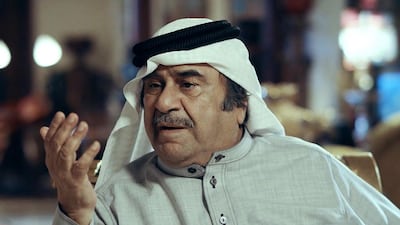Abdulhussein Abdulredha, whose off-script wit and comedic talent on stage provided Kuwaitis with endless laughter and a unique voice for some of the region’s most pertinent issues, died on August 12 in London. He was 78.
Beyond providing Kuwaitis entertainment over half a century of performance, Abdulredha reminded his countrymen they possess the unique right to express themselves freely, and that regardless of how difficult, dire, or sad times might get, that it is entirely necessary to take a moment to laugh.
His performances extended far beyond his country’s borders. They were often insights into Arab society, winning the hearts of viewers around the world with his quick-witted charisma on stage and off-the-cuff quips hitting at the heart of many of the Arab world’s most pressing problems.
For Kuwaitis and to Gulf citizens at large, his performances provided not only an escape from the harsh realities of a country that was developing, at times too aggressively, but also a guiding light in how to deal with the changes and how to maintain a sense of identity.
It was often the grey areas of social life that neither politics nor the media could fully address in which Abdulredha squarely found a home and built his following. He provided an exclusive insight into Gulf culture throughout his hundreds of performances acting, writing and directing plays and television.
In the 1970s, while Kuwaitis began travelling abroad for both work and play, Abdulredha's stage performance as a freewheeling Kuwaiti in Bye Bye London brought into light the taboo of a Gulf man abroad whose devoutness would suddenly disappear upon arriving at the London Hotel's open bar and casino, where the tinted windows did little to conceal the several men wearing Arab headdress.
On a more sombre topic, Saif Al Arab, performed months after the liberation of Kuwait, gave Kuwaitis a chance to reflect on the realities of Abdulredha's performance as an old Kuwaiti man weighing up whether to escape Kuwait during Iraq's invasion of the country.
Halfway through the play, Abdulredha’s character dies just before Saddam Hussein enters the scene, played by none other than the Kuwaiti himself. Throughout his performance as both characters, the actor touched on ideals of loyalty, the fear of a home lost and the resilience of Arab unity at a time when every aspect of that idea was being challenged.
Making the changes palpable to the Kuwaiti people in his own unique voice was essential to his performances. But Abdulredha was also the premier cultural ambassador for Kuwait, presenting an insight into his own culture, his people’s concerns and their sentiments to the greater Arab world.
Abdulredha’s acting career, which started in the 1960s, is regarded as the cornerstone of Gulf comedy and main driver behind the golden age of Kuwaiti theatre in the 1970s and 1980s. He shared the stage with other comedic greats Saad Al Faraj and Khalid Al Nafisi.
Perhaps more importantly, is how influential he was in establishing the identity of not only the Gulf comedic personality, but the modern Gulf man.
Quick-witted banter with other actors who shared the stage with him and his ability to veer off-script during one of his famous monologue rants that so accurately represented public sentiment were key to his rise as the country’s most beloved actor.
Abdulredha’s social and political opinions, eloquently wrapped in comedic jest, reflected so accurately attitudes at the time that his performances are easily seen as insights into Kuwaiti history.
His voice stretched our ability to challenge any political or social force that attempts to silence the Kuwaiti liberalism, one that is willing to not only talk about the country’s most pressing problems but to poke fun at them.
Abdulredha’s legacy will live on in all Gulf peoples' sense of humour and in the very core of what it means to be a Kuwaiti.

